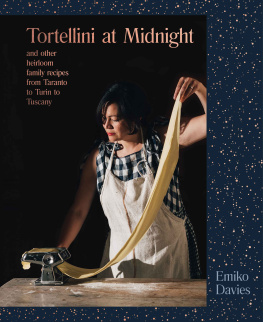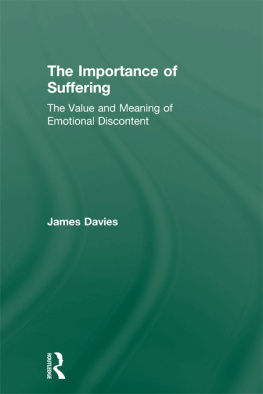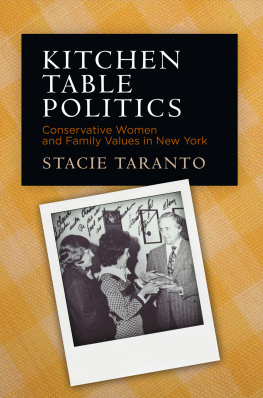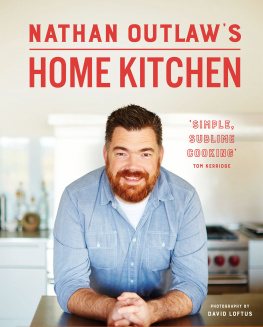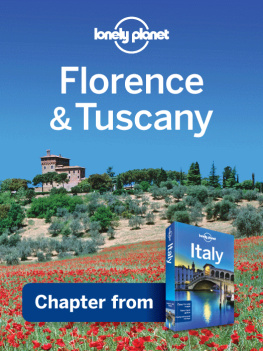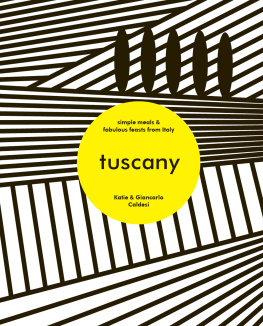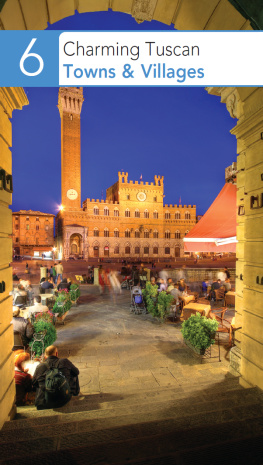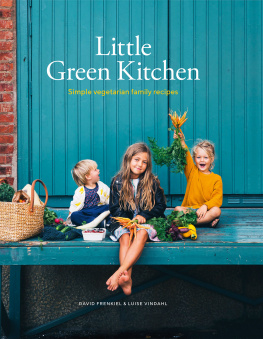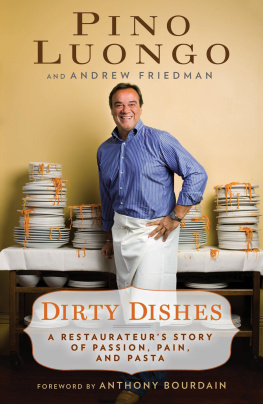Tessa Kiros
AUTHOR OF TEN COOKBOOKS INCLUDING FALLING CLOUDBERRIES AND PROVENCE TO PONDICHERRY
My connection with Emiko, who I have gotten to know here in Italy, is that we are both foreigners of mixed heritage living in Tuscany, and are both married to Tuscan men.
We are raising our families within greater, extended families that have strong traditions spanning generations, while also appreciating and celebrating traditions from other parts of the world.
As outsiders, it is not easy to approach a traditional familys cuisine. From our different balconies, we can observe. We can write our stories, then pass them humbly forward. This is our honour.
Over aperitivo, I listened as Emiko spoke of how her husband Marcos great-grandparents had loved and married and journeyed. This truly was a love story: of Nicola, a postman, and Anna, a noblewoman. Their love was a turning point in the history of their families that so easily could have become a different story.
Emiko guides us with her strong arms through the streets of this familys journey, from southern to northern, and central Italy. Along the way, Anna and Nicola had nine children, one of who was Mario, Emikos husbands grandfather.
Anna and Nicolas story was the starting point: the foundation for their future families. Nicola loved Neapolitan songs, while Anna is remembered for her mountains of polpette these became her daughter-in-law Linas best-foot-forward recipe: the exotic dish she would make when guests came. Lina also took the responsibility of making her own husband, Mario, happy very seriously, for Mario made all the desserts in the house. He was also a master of preparing quick, tasty meals for himself when he came home late from work, some of which are peppered throughout these pages.
Emiko was unsure of how the real story of Annas family origin ended. How did they really feel? Did they ever accept her choice of love? But what I really wanted to know at this point in our conversation by now, I was all-ears was whether or not they worked out the ingredients in Marios cake? And, as I listened, I wanted to know what else they would have taken with them from Taranto? I would have loved to have confirmed with them how different their lives must have been after that journey.
These are my favourite kinds of stories. The ones where the family the people keep their history and recipes alive and blossoming, and their family roots nourished.
Some people hold the baton and can pass that legacy on. Emiko is, like Nicola was, a messenger, posting stories and recipes for her family to hold and for us to walk side-by-side with.
As we finish talking and I look through the pages of Emikos book, I am left holding a parcel of thoughts among them, the chocolate sandwich, the baked oysters, Nonna Annas polpette, braciolina al burro, a few truffles. And the urge to travel the length of Italy.
CONTENTS
Dont eat anything your great-grandmother wouldnt recognise as food.
MICHAEL POLLAN, IN DEFENSE OF FOOD, 2008
Almost everyone in Italy has memories of being with a grandmother in the kitchen.
CAROL FIELD, IN NONNAS KITCHEN, 1997
Heirloom recipes tell a story about family through food the sort of food that, ironically, doesnt come out of a cookbook. Many recipes are learned through tasting and watching, usually from the kitchen table, and through repetition (and a lot of it, because an unchanging dinner repertoire is comforting and easy). They are absorbed through sound, texture and smell that pathway to memory so that, even as adults, some family members can still recite a recipe that they ate often as a child, even if they had never cooked it.
Reviving the recipes of past generations is good for the soul, but its also simply good; it reflects a time before processed food even before refrigeration when food was always fresh and nothing went to waste. Its a way of cooking and eating that relies on the seasons and what is locally available, and, in the spirit of cucina povera, makes the most of relatively little. It means cooking and eating together around the table and taking the time to be with the family.
Here, I have gathered some of the favourite recipes from our Italian family, tracing back recipes to generations that span the entire length of Italy, from the Mediterranean port city of Taranto in the southern heel of Puglia, to elegant Turin, the city of aperitivo and Italian caf culture in the far north on the border of France and, finally, back to Tuscany, where we call home.
Mine and my husband Marcos families could not be more different. I grew up in a multiracial family a Japanese mother and an Australian father in suburban Australia, before my diplomat father took us back and forth to China for eight years. My mother, the daughter of a vegetarian Buddhist priest, made us wonderful home-cooked meals. During my upbringing in Australia, she cooked for us every day until we moved to Beijing, where there was a gentle and friendly cook, Mr Zhang, who prepared weekday meals for us. I grew up always loving food; I was an adventurous eater, a keen baker and was always curious about the kitchen.
Marco, on the other hand, grew up in a small town in Tuscany, halfway between Florence and Pisa. He lived with his parents and grandparents under the very same roof that was built by his great-grandfather. Meals for the entire family were usually prepared by Marcos grandmother Lina (decidedly the best cook in the family) and sometimes by his grandfather Mario (a dapper Taranto-born, Turin-raised lover of cheese), who dabbled in desserts, quick dinners and treats, such as fried mozzarella sandwiches. Until we moved in together, Marco had never even so much as picked up a wooden spoon to stir a pot, such was Nonna Linas long and beloved reign over the kitchen.
Our kitchen today, in a hilltop neighbourhood overlooking Florence, is small, but it is the heart of our home. Its where we play, relax, cook and eat together. Its where we prepare the food that reminds us of our grandparents and of trips we have made to Puglia and Piedmont, and where, together, we eat the dishes that will become new memories for our daughters.

